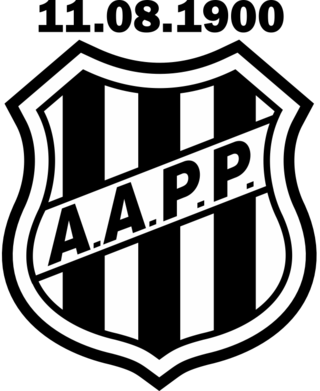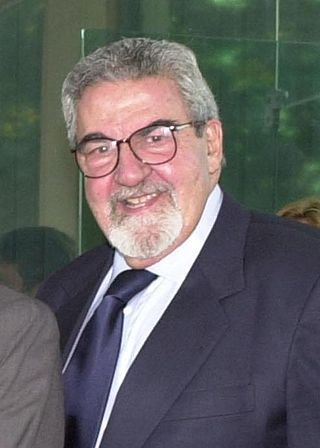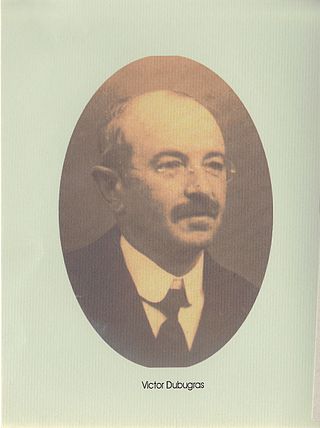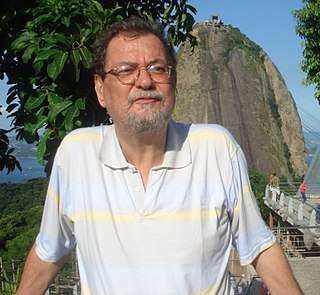Related Research Articles

Associação Atlética Ponte Preta, commonly referred to as simply Ponte Preta, is a Brazilian association football club in Campinas, São Paulo. They currently play in the Série B, the second tier of Brazilian football, as well as in the Campeonato Paulista Série A1, the top tier of the São Paulo state football league.
Guto Requena is a Brazilian architect and designer. He graduated in Architecture & Urbanism from the São Carlos Engineering School, a faculty of the University of São Paulo, in 1999.

Marcelo Caetano Moraes is a writer, professor and pianist from Brazil., critic, journalist.

Igor de Vetyemy, is a Brazilian architect, urban planner, professor and designer. Considered to be one of the exponents of avant-garde Brazilian architecture, he represented the country, together with Paulo Mendes da Rocha and others, in 2008 London Festival of Architecture. In his book "Exhibit Design: The Future", the North American Critic Georges Jacob describes de Vetyemy as "an oxford educated proponent of bio-climate architecture, who believes in surprising the senses." With a focus in Sustainable architecture and another in formal space research, the architect's projects always intend to surprise human senses, emphasizing the sensitive character of architecture. Between 2000 and 2012, de Vetyemy studied in Rio de Janeiro, Oxford and Delft. In 2006, he became an Architecture Professor at Estácio de Sá University and, in 2008, at the Federal University of Rio de Janeiro. Having studied with Master Oscar Niemeyer himself in the beginning of the 2000s, the influence of the "reinforced concrete poet" is clear in the first years of his career. Manuel Sanches, a Brazilian architect, sociologist and Politic Sciences professor at the Federal University of Rio de Janeiro, considers Igor de Vetyemy's work "a demonstration that Brazilian contemporary architecture is worthy of the prestige it has since Niemeyer designed Pampulha(...) Surprising, innovative in the use of materials, in the proposal of constructive methods and, above all, in aesthetics.". But despite the strong influence of Brazilian Masters of tropical modernism, according to the British critic Richard J. Williams, Igor de Vetyemy represents a shift from that architecture in the approach to the vernacular sensuality of Brazilian architecture. In his words, "Niemeyer and his circle pretended that such commodification did not exist, but ended up, by default, endorsing it. Vetyemy recognizes the reality of the situation. Such frankness (...) suggests a less romantic, but more realistic, future.".
Grendene is a Brazilian company that is the world's largest manufacturer of sandals. It was founded by Alexandre Grendene Bartelle and his twin brother Pedro Grendene Bartelle.

Events from the year 2008 in Brazil.

Events in the year 1976 in Brazil.

Luiz Paulo Fernández Conde was a Brazilian architect and politician. He was Mayor of Rio de Janeiro from 1997 to 2001 and Vice Governor from 2003 to 2007.

São Cristóvão Station is a railway station in São Cristóvão, Rio de Janeiro which is serviced by the Rio de Janeiro Metro and SuperVia.

Events in the year 2006 in Brazil.

The following lists events that happened in the year 1989 in Brazil.

Events in the year 1988 in Brazil.

Events in the year 1974 in Brazil.

Anna Maria Baldo Niemeyer was a Brazilian architect, furniture designer and gallery owner. The only daughter of Oscar Niemeyer, she worked with her father to design the civic buildings for Brasília, focusing primarily on interior spaces and decoration. When her father decided to make furniture to harmonize his structures with the design elements, she turned her interest to furniture designing. Her two most noted designs were the initial prototype called the "Alta" and the "Rio". In her later career, she ran an art gallery in Rio, which at one time was the only gallery in the city, and assisted in the creation of the Niterói Contemporary Art Museum.

Palácio dos Bandeirantes is a palace in São Paulo, Brazil. It is the seat of the São Paulo state government and the governor's official residence. The palace, located at the Morumbi district, also houses some secretaries and a wide historical and artistic exhibition open to the public.

Events in the year 2019 in Brazil.

The 2020 Rio de Janeiro municipal election took place in the city of Rio de Janeiro, Brazil in November 2020 to elect a mayor, a vice mayor, and 51 city councillors for the administration of the city. On the 29 November 2020 run-off election, former mayor Eduardo Paes, of the Democrats (DEM), defeated incumbent mayor Marcelo Crivella of the Republicans (REP), who lost his bid for re-election.

Victor Dubugras was a French architect who grew up in Argentina and settled in Brazil.

Demetre Basile Anastassakis was a Greek-Brazilian architect who worked mainly in the fields of social housing and urban planning. He was president of the Rio de Janeiro section of the Brazilian Institute of Architects (IAB) from 1994 to 1995 and national president of the same institution from 2004 to 2006. He received the distinction of Architect of the Year awarded by the Brazilian National Federation of Architects and Urbanists in 2006.
References
- ↑ "DGTL Barcelona - DGTL unveils its DGTL Art program". bcn.dgtl.nl.
- ↑ Baratto, Romullo (November 25, 2014). "Lançamento do livro "Timespaces" de Muti Randolph no MIS-SP". ArchDaily Brasil.
- ↑ Franklin, Dennis. "D-Edge by Muti Randolph + Marcelo Pontes + Zemel + Chalabi Arquitetos".
- ↑ "D-Edge / Muti Randolph + Marcelo Pontes + Zemel + Chalabi Arquitetos". ArchDaily. January 13, 2014.
- ↑ Kim, John. "Nike Launches "Rio Unlimited" Interactive space in Downtown Rio". Freshness Mag.
- ↑ "Nike Sets Up Shop at the Rio Olympic Games | News". R/GA.
- ↑ "Muti Randolph". The Creators Project. May 3, 2010.
- 1 2 Block, Annie (October 6, 2017). "Muti Randolph Creates an Immersive Experience for SoHo Shoe Emporium Galeria Melissa". Interior Design.
- ↑ "Para Muti Randolph, tecnologia é o caminho para sustentabilidade". GQ.